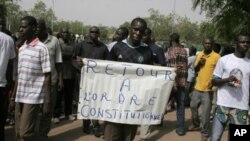|
Important Dates in Mali's History: September 22, 1960 - The Republic of Mali declares independence from France. President Modibo Keita declares a single-party state. November 19, 1968 - A bloodless coup puts Lt. Moussa Traore into power. Under his rule, Mali approves a new constitution, but is still a single-party state. June 1979 - Mr. Traore, now a general, wins 99% of the vote in a single-party election. 1980 - Student-led, anti-government protests are brutally put down and three coup attempts are foiled. General Traore stays in power. March 22-26, 1991 - After four days of intense anti-government rioting, President Traore is overthrown in a military coup. 1991-1992 - General Amadou Toumani Toure leads a transition back to civilian rule. Mali's new constitution allows political parties to form freely. 1992-2002 - Alpha Oumar Konare is elected and serves two terms as president. He does not seek re-election to a third term. 2002-2012 - General Amadou Toumani Toure, now retired from the military, is elected president and also serves two terms. He says he will not seek a 3rd term. March 21-22, 2012 - Soldiers protest against the government's handling of the Tuareg rebellion and declare a coup. |
The United States is suspending all non-humanitarian assistance to Mali, following last week's coup d'état. Secretary of State Hillary Clinton spoke Monday with Ivory Coast President Alassane Ouattara about regional efforts to restore Mali's democratically-elected leaders.
State Department Spokeswoman Victoria Nuland says the Obama administration has suspended as much as $60 million in non-humanitarian assistance as U.S. officials work with the regional Economic Community of West African States to return Mali to democratic rule.
“Like ECOWAS, like the African Union, we want to see the elected government restored as quickly as possible, so that we can get to the elections which are scheduled to go forward shortly," she said. "We will continue through USAID to provide humanitarian and food assistance to those displaced by the conflict in the north and those affected by the region's food crisis.”
Soldiers last week ousted Mali President Amadou Toumani Toure because of what they said was his “incompetence” in battling a rebellion by ethnic Tuareg in the northern part of the country. Presidential elections were planned for next month in which Mr. Toure was not a candidate.
ECOWAS has invited coup leaders to send a representative to a heads-of-state meeting in Abidjan on Tuesday to stress the importance of getting Mali back to democracy. Nuland says Secretary Clinton spoke with Ivorian President Ouattara on Monday to support those efforts.
Much of the non-humanitarian, government-to-government aid suspended by Washington goes to security, helping the army fight Tuareg insurgents and al-Qaida in the Islamic Maghreb militants.
Nuland says the urgency of those security concerns are a big part of why the United States and its African allies are hoping that Mali's mutinous troops stand down.
“Only the Tuareg have benefited from the situation. And that is among the reasons why this issue has to be resolved immediately," she said. "And our main point and ECOWAS's main point - and President Ouattara said this to the Secretary today - in pressing the mutineers to restore civilian government the point is being made: Yes, they have some grievances with the government. Those grievances need to be addressed. But they need to be addressed so that the military can go back to doing the job that it has to do to secure the country, namely to go after the Tuareg and other threats to security in Mali.”
Ethnic Tuareg have fought repeatedly for greater autonomy in parts of Mali and Niger. The current rebellion in Mali began in January after Tuareg fighters returned from Libya, where they had been working for Moammar Gadhafi. The United Nations says fighting in Mali has driven nearly 200,000 civilians from their homes.




